Unit 1 Where did you go on vacation Section A 1a-2d 课件+音频(共27张PPT)人教版八年级上册
文档属性
| 名称 | Unit 1 Where did you go on vacation Section A 1a-2d 课件+音频(共27张PPT)人教版八年级上册 |
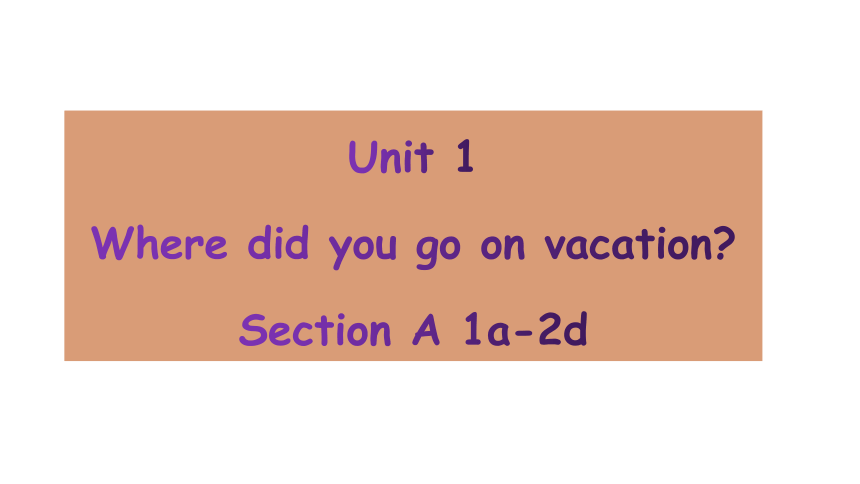
|
|
| 格式 | pptx | ||
| 文件大小 | 12.6MB | ||
| 资源类型 | 教案 | ||
| 版本资源 | 人教新目标(Go for it)版 | ||
| 科目 | 英语 | ||
| 更新时间 | 2024-09-06 08:27:09 | ||
图片预览

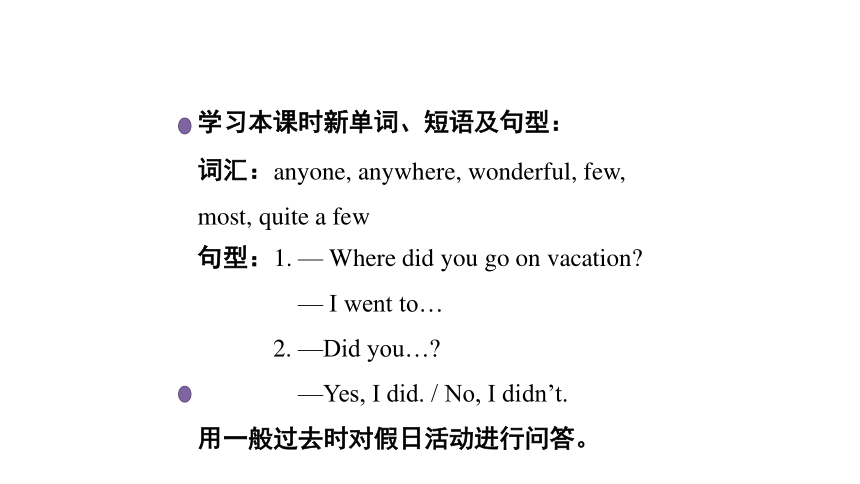
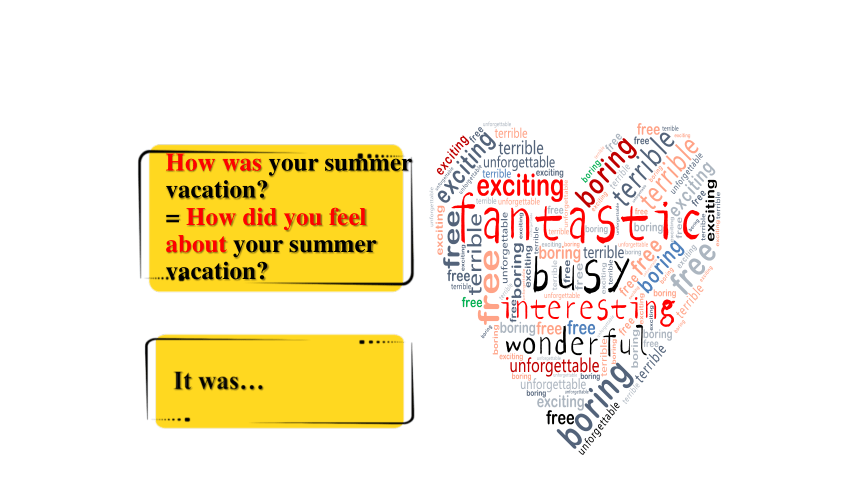
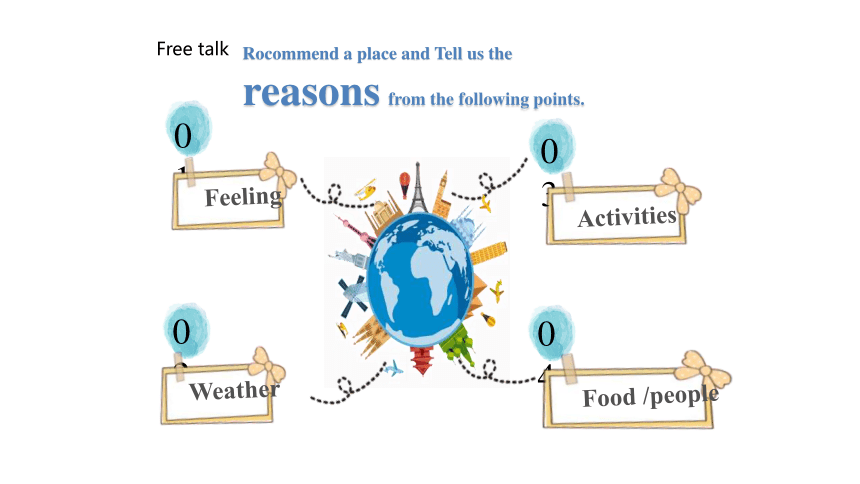
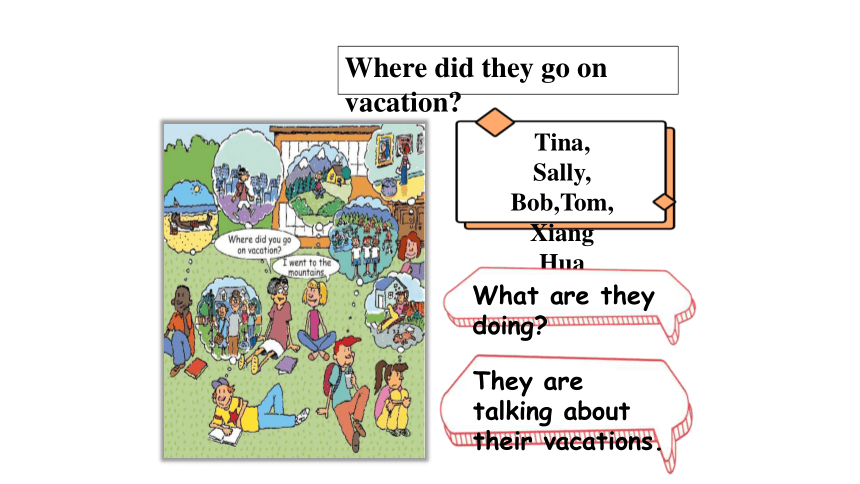
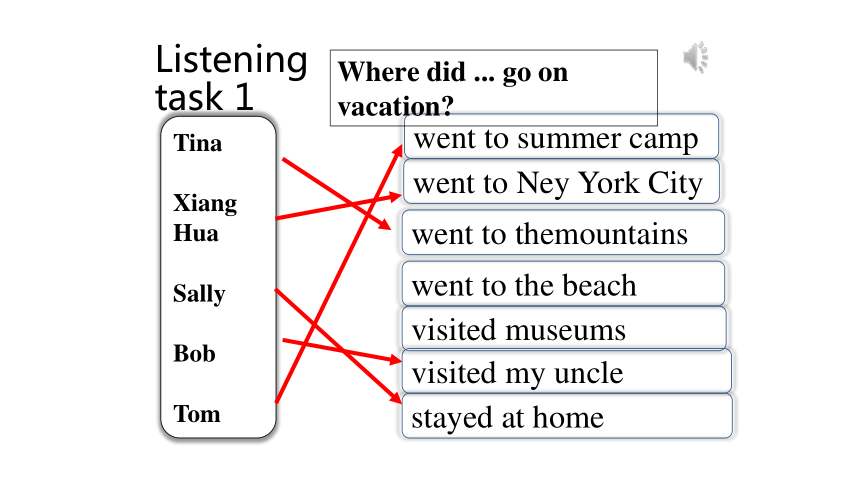
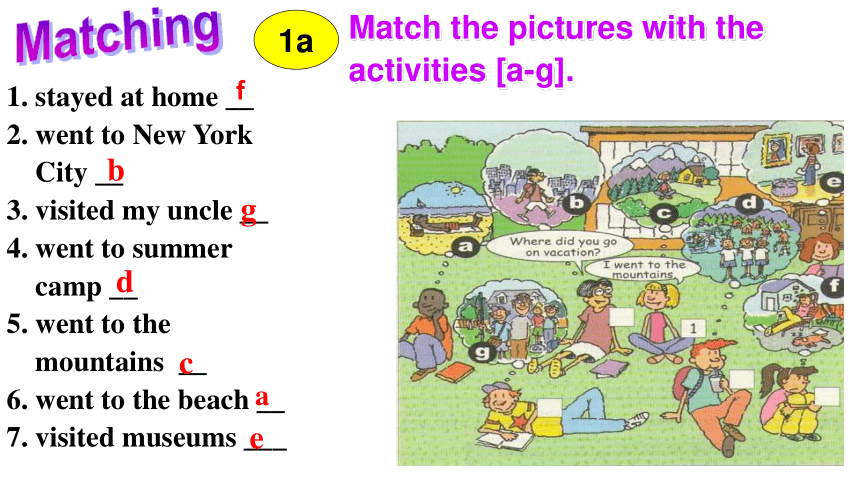
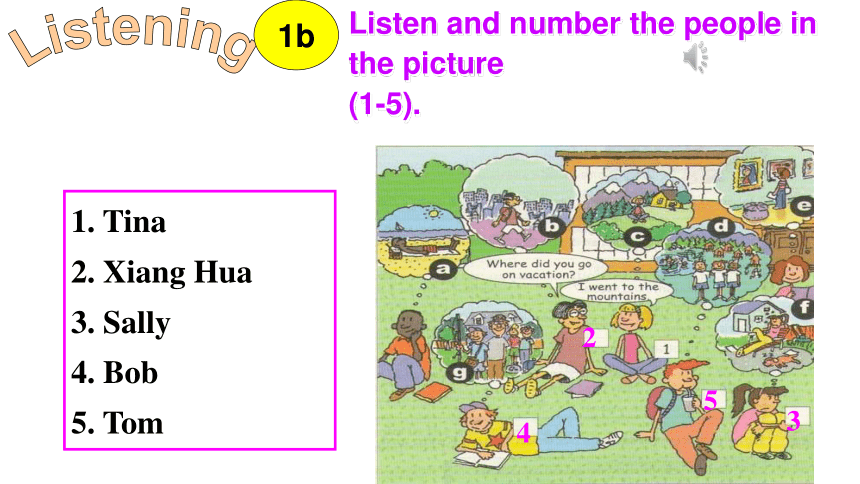
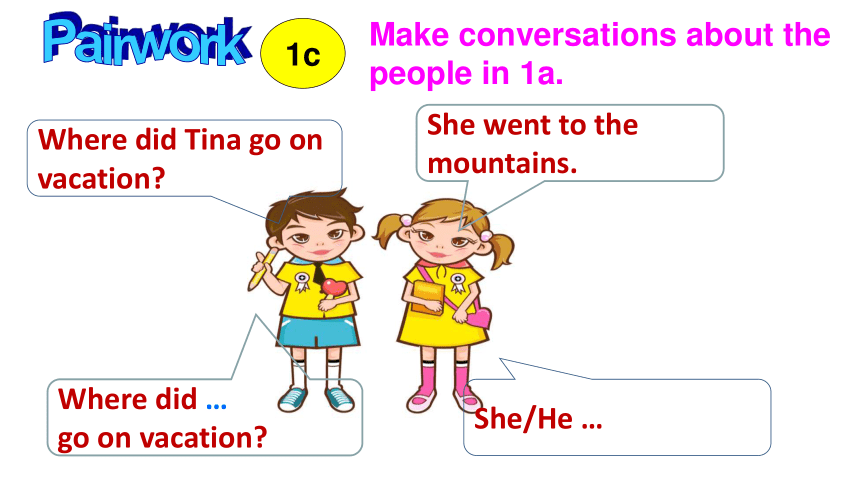
文档简介
(共27张PPT)
Unit 1
Where did you go on vacation
Section A 1a-2d
Learning objectives
学习本课时新单词、短语及句型:
词汇:anyone, anywhere, wonderful, few, most, quite a few
句型:1. — Where did you go on vacation
— I went to…
2. —Did you…
—Yes, I did. / No, I didn’t.
用一般过去时对假日活动进行问答。
Free talk
How was your summer vacation
= How did you feel about your summer vacation
It was…
Free talk
01
02
03
04
Feeling
Weather
Activities
Food /people
Rocommend a place and Tell us the reasons from the following points.
Listening task 1
Where did they go on vacation
Tina, Sally, Bob,Tom, Xiang Hua
What are they doing
They are talking about their vacations.
Listening task 1
Tina
Xiang Hua
Sally
Bob
Tom
visited my uncle
went to Ney York City
stayed at home
went to themountains
went to summer camp
visited museums
went to the beach
Where did ... go on vacation
Matching
1. stayed at home __
2. went to New York
City __
3. visited my uncle __
4. went to summer
camp __
5. went to the
mountains __
6. went to the beach __
7. visited museums ___
b
d
c
g
a
e
Match the pictures with the activities [a-g].
1a
f
Listen and number the people in the picture
(1-5).
Listening
1. Tina
2. Xiang Hua
3. Sally
4. Bob
5. Tom
4
3
2
5
1b
Pairwork
Make conversations about the people in 1a.
Where did Tina go on vacation
She went to the mountains.
Where did …
go on vacation
She/He …
1c
How was your vacation
Great!
Where did you go
I went to the mountains.
Practice
Make your own
conversations.
People Places
Grace
Kevin
Julie
Let’s listen.
Listen. Where did the people go on vacation Complete the chart.
New York City/
Central Park
the beach
home
听写策略:第一遍听时,边听边记录首字母。
2a
Did they go with anyone
Did they buy anything special
Did they meet anyone interesting
Did they do anything interesting
Listen again and check!
Please circle the indefinite pronoun(不定代词) and pay attention to the position(位置) of the adjective.
任何人
任何东西
任何事情
不定代词
形容词修饰不定代词要后置
√
Listen again. Check(√) Yes, I did or No, I didn't for each question.
2b
√
√
√
√
√
√
√
Role-play conversations between Grace, Kevin and Julie.
I went to New York City.
Grace,where did you go on vacation
Oh, really Did you go with anyone
Yes, I went with Jenny.
2c
Yes, It was so beautiful
2d
Read the conversation and answer the questions.
1.When was Helen on vacation
2.Where did Helen go
3. Did Helen take photos there
4. Did Rick do anything special last month What did he do
Last month.
She went to Guizhou.
Yes, she did.
No, he didn’t. He just stayed at home most of the time to read and relax.
Role-play the conversation.
Rick: Hi, Helen._________________.
Helen: Hi, Rick. Yes, I was ________________ last month.
Rick: Oh, did you go ___________________
Helen: Yes, I went to Guizhou _______________.
Rick: Wow! Did you see______________________
Helen: Yes, I did. It was wonderful! We took_______________there.
What about you Did you do ________________ last month
Rick: Not really. I just _________________ most of the time
_________________.
Long time no see
on vacation
anywhere interesting
with my family
Huangguoshu Waterfall
quite a few photos
anything special
stayed at home
to read and relax
2d
Explanation
1. Did you buy anything special
在英语中,anything, something, nothing和everything是用于指代事物的复合不定代词,与之相对应的复合不定代词anyone, someone, no one和everyone (anybody, somebody, nobody和everybody) 用于指人。与形容词连用时,形容词必须置于复合不定词之后,语法上称作“后置”。
e.g. I can see someone new in your group.
There’s nothing interesting in the news today.
2. Did you go anywhere interesting
anywhere意为“在任何地方”,常用于一般疑问句或否定句中,代替somewhere。
e.g. I can’t find my keys anywhere.我到处也找不到我的钥匙。
3. We took quite a few photos there.
a few 一些,若干=some,后跟可数名词复数形式。
quite a few 意为“相当多;不少(=many)”后跟可数名词复数形式。
e.g. A few girls are playing volleyball. 几个女孩正在打排球。
There are quite a few birds in the forest.
在那片森林里有很多鸟。
4. I just stayed at home most of the time to read and relax.
most意为“大多数”,后跟可数名词或不可数名词均可。
e.g. Most students go to school on foot.
大多数学生步行去上学。
【辨析】
most + 名词 泛指多数,无范围;
most + of + the (this/that/those/these等)名词 ,指某一范围内的多数。
e.g. Most of the students go to school by bike.
这些学生们中的多数骑自行车去上学。
复合不定代词
复合不定代词是由some-,any-,no-,every-加上-one,-body,-thing等所组成的意思不确定定的代词。
复合不定代词包括十二个:
something, somebody, someone, anything, anybody, anyone,
nothing, nobody, no one,
everything, everybody, everyone
这些复合代词具有名词性质,在句中可用作主语、宾语或表语,但不能用作定语。
由some-和any-所构成的复合不定代词的基本用法与some和any的用法一样。
something,someone,somebody通常用于肯定句中,而anything,anyone,anybody一般用于否定句,疑问句或条件状语从句中。如:
He found something strange but interesting.他发现了一些奇怪但却有趣的事情。
Do you have anything to say ?你有话要说吗?
I can’t meet anybody on the island. 在岛上,我没遇见任何人。
1、与形容词连用时,形容词必须置于复合不定词之后,语法上称作“后置”。
例如:I can see someone new in your group.
There’s nothing interesting in the news today.
2、复合不定代词都具有单数的含义,因此通常被看成是单数第三人称。当它们充当句子的主语时,其后的谓语动词用单数形式。如:
Is everyone here today 今天,大家都到齐了吗?
Nothing is difficult if you put your heart into it. 世上无难事,只怕有心人。
复合不定代词的特殊用法
3、在表示请求、邀请、提建议等带有委婉语气的疑问句,和希望得到对方肯定答复的疑问句,以及表示反问的问句中,也用something,someone,somebody等复合不定代词。如:Would you like something to eat?要些吃的东西吗?
4、当anything表示“任何事(物),无论何事(物)”,anyone,anybody表示“无论谁,任何人”等意义时,它们也可以用于肯定句中。如:
Anything is OK. 什么都行。
Anybody knows the answer.任何人都知道答案。
不定代词的用法
买特别的东西 buy something special
做无聊的事 do something boring
有重要的事 have something important
没什么有趣的 nothing interesting
去有趣的地方 go somewhere interesting
不同的事 something different
没什么开心的 nothing fun
有用的事 something useful
令人放松的事 something relaxing
没什么严重的 nothing serious
Exercise
根据汉语提示完成句子。
1. Did he go out with _______ (任何人)
2. They didn’t buy ________ ______ (特殊的东西) there yesterday.
3. Tell us __________ __________ (有趣的事情) about your vacation, Jenny.
4. They caught ______ ___ ____ (相当多的) insects in the forest.
5. _____ __ ___ (大多数) students can get to school early.
anyone
something interesting
anything special
quite a few
Most of the
1. Lucy did her homework yesterday evening. (改为否定句)
Lucy ______ __ _____ _________ yesterday evening.
2. I had lunch at my friend’s home.
(改为一般疑问句,并作肯定回答)
—____ you ______ _____ at your friend’s home
—______, ___ _____.
3. Jim went to the beach last Sunday. (对画线部分提问)
_____ _____ Jim ______ last Sunday
4. They played basketball yesterday. (对画线部分提问)
________ _______ they play basketball
5. The students had great fun in the park. (改为同义句)
The students _____ ______ ____ _______ in the park.
didn’t do her homework
Did have lunch
Yes I did
What did do
V. 根据要求改写下列句子。
When did
had a good / great time
四、 根据汉语提示完成下列句子。
1. 琳达刚才在这个超市里买了很多苹果。
Linda just bought quite a few apples at this supermarket.
2. 玛丽和她的妹妹上周日去中央公园了。
Mary and her sister went to Central Park last Sunday.
3. 露西和拉里昨天去了什么有意思的地方吗?
Did Lucy and Larry go anywhere interesting yesterday
4. 上个月我们在长城拍了许多照片。
We took many photos on the Great Wall last month.
5. 上周她大部分时间都在学校。
She was at school most of the time last week.
quite
a
few
went
to
Central
Park
anywhere
interesting
took
many
photos
most
of
the
time
Unit 1
Where did you go on vacation
Section A 1a-2d
Learning objectives
学习本课时新单词、短语及句型:
词汇:anyone, anywhere, wonderful, few, most, quite a few
句型:1. — Where did you go on vacation
— I went to…
2. —Did you…
—Yes, I did. / No, I didn’t.
用一般过去时对假日活动进行问答。
Free talk
How was your summer vacation
= How did you feel about your summer vacation
It was…
Free talk
01
02
03
04
Feeling
Weather
Activities
Food /people
Rocommend a place and Tell us the reasons from the following points.
Listening task 1
Where did they go on vacation
Tina, Sally, Bob,Tom, Xiang Hua
What are they doing
They are talking about their vacations.
Listening task 1
Tina
Xiang Hua
Sally
Bob
Tom
visited my uncle
went to Ney York City
stayed at home
went to themountains
went to summer camp
visited museums
went to the beach
Where did ... go on vacation
Matching
1. stayed at home __
2. went to New York
City __
3. visited my uncle __
4. went to summer
camp __
5. went to the
mountains __
6. went to the beach __
7. visited museums ___
b
d
c
g
a
e
Match the pictures with the activities [a-g].
1a
f
Listen and number the people in the picture
(1-5).
Listening
1. Tina
2. Xiang Hua
3. Sally
4. Bob
5. Tom
4
3
2
5
1b
Pairwork
Make conversations about the people in 1a.
Where did Tina go on vacation
She went to the mountains.
Where did …
go on vacation
She/He …
1c
How was your vacation
Great!
Where did you go
I went to the mountains.
Practice
Make your own
conversations.
People Places
Grace
Kevin
Julie
Let’s listen.
Listen. Where did the people go on vacation Complete the chart.
New York City/
Central Park
the beach
home
听写策略:第一遍听时,边听边记录首字母。
2a
Did they go with anyone
Did they buy anything special
Did they meet anyone interesting
Did they do anything interesting
Listen again and check!
Please circle the indefinite pronoun(不定代词) and pay attention to the position(位置) of the adjective.
任何人
任何东西
任何事情
不定代词
形容词修饰不定代词要后置
√
Listen again. Check(√) Yes, I did or No, I didn't for each question.
2b
√
√
√
√
√
√
√
Role-play conversations between Grace, Kevin and Julie.
I went to New York City.
Grace,where did you go on vacation
Oh, really Did you go with anyone
Yes, I went with Jenny.
2c
Yes, It was so beautiful
2d
Read the conversation and answer the questions.
1.When was Helen on vacation
2.Where did Helen go
3. Did Helen take photos there
4. Did Rick do anything special last month What did he do
Last month.
She went to Guizhou.
Yes, she did.
No, he didn’t. He just stayed at home most of the time to read and relax.
Role-play the conversation.
Rick: Hi, Helen._________________.
Helen: Hi, Rick. Yes, I was ________________ last month.
Rick: Oh, did you go ___________________
Helen: Yes, I went to Guizhou _______________.
Rick: Wow! Did you see______________________
Helen: Yes, I did. It was wonderful! We took_______________there.
What about you Did you do ________________ last month
Rick: Not really. I just _________________ most of the time
_________________.
Long time no see
on vacation
anywhere interesting
with my family
Huangguoshu Waterfall
quite a few photos
anything special
stayed at home
to read and relax
2d
Explanation
1. Did you buy anything special
在英语中,anything, something, nothing和everything是用于指代事物的复合不定代词,与之相对应的复合不定代词anyone, someone, no one和everyone (anybody, somebody, nobody和everybody) 用于指人。与形容词连用时,形容词必须置于复合不定词之后,语法上称作“后置”。
e.g. I can see someone new in your group.
There’s nothing interesting in the news today.
2. Did you go anywhere interesting
anywhere意为“在任何地方”,常用于一般疑问句或否定句中,代替somewhere。
e.g. I can’t find my keys anywhere.我到处也找不到我的钥匙。
3. We took quite a few photos there.
a few 一些,若干=some,后跟可数名词复数形式。
quite a few 意为“相当多;不少(=many)”后跟可数名词复数形式。
e.g. A few girls are playing volleyball. 几个女孩正在打排球。
There are quite a few birds in the forest.
在那片森林里有很多鸟。
4. I just stayed at home most of the time to read and relax.
most意为“大多数”,后跟可数名词或不可数名词均可。
e.g. Most students go to school on foot.
大多数学生步行去上学。
【辨析】
most + 名词 泛指多数,无范围;
most + of + the (this/that/those/these等)名词 ,指某一范围内的多数。
e.g. Most of the students go to school by bike.
这些学生们中的多数骑自行车去上学。
复合不定代词
复合不定代词是由some-,any-,no-,every-加上-one,-body,-thing等所组成的意思不确定定的代词。
复合不定代词包括十二个:
something, somebody, someone, anything, anybody, anyone,
nothing, nobody, no one,
everything, everybody, everyone
这些复合代词具有名词性质,在句中可用作主语、宾语或表语,但不能用作定语。
由some-和any-所构成的复合不定代词的基本用法与some和any的用法一样。
something,someone,somebody通常用于肯定句中,而anything,anyone,anybody一般用于否定句,疑问句或条件状语从句中。如:
He found something strange but interesting.他发现了一些奇怪但却有趣的事情。
Do you have anything to say ?你有话要说吗?
I can’t meet anybody on the island. 在岛上,我没遇见任何人。
1、与形容词连用时,形容词必须置于复合不定词之后,语法上称作“后置”。
例如:I can see someone new in your group.
There’s nothing interesting in the news today.
2、复合不定代词都具有单数的含义,因此通常被看成是单数第三人称。当它们充当句子的主语时,其后的谓语动词用单数形式。如:
Is everyone here today 今天,大家都到齐了吗?
Nothing is difficult if you put your heart into it. 世上无难事,只怕有心人。
复合不定代词的特殊用法
3、在表示请求、邀请、提建议等带有委婉语气的疑问句,和希望得到对方肯定答复的疑问句,以及表示反问的问句中,也用something,someone,somebody等复合不定代词。如:Would you like something to eat?要些吃的东西吗?
4、当anything表示“任何事(物),无论何事(物)”,anyone,anybody表示“无论谁,任何人”等意义时,它们也可以用于肯定句中。如:
Anything is OK. 什么都行。
Anybody knows the answer.任何人都知道答案。
不定代词的用法
买特别的东西 buy something special
做无聊的事 do something boring
有重要的事 have something important
没什么有趣的 nothing interesting
去有趣的地方 go somewhere interesting
不同的事 something different
没什么开心的 nothing fun
有用的事 something useful
令人放松的事 something relaxing
没什么严重的 nothing serious
Exercise
根据汉语提示完成句子。
1. Did he go out with _______ (任何人)
2. They didn’t buy ________ ______ (特殊的东西) there yesterday.
3. Tell us __________ __________ (有趣的事情) about your vacation, Jenny.
4. They caught ______ ___ ____ (相当多的) insects in the forest.
5. _____ __ ___ (大多数) students can get to school early.
anyone
something interesting
anything special
quite a few
Most of the
1. Lucy did her homework yesterday evening. (改为否定句)
Lucy ______ __ _____ _________ yesterday evening.
2. I had lunch at my friend’s home.
(改为一般疑问句,并作肯定回答)
—____ you ______ _____ at your friend’s home
—______, ___ _____.
3. Jim went to the beach last Sunday. (对画线部分提问)
_____ _____ Jim ______ last Sunday
4. They played basketball yesterday. (对画线部分提问)
________ _______ they play basketball
5. The students had great fun in the park. (改为同义句)
The students _____ ______ ____ _______ in the park.
didn’t do her homework
Did have lunch
Yes I did
What did do
V. 根据要求改写下列句子。
When did
had a good / great time
四、 根据汉语提示完成下列句子。
1. 琳达刚才在这个超市里买了很多苹果。
Linda just bought quite a few apples at this supermarket.
2. 玛丽和她的妹妹上周日去中央公园了。
Mary and her sister went to Central Park last Sunday.
3. 露西和拉里昨天去了什么有意思的地方吗?
Did Lucy and Larry go anywhere interesting yesterday
4. 上个月我们在长城拍了许多照片。
We took many photos on the Great Wall last month.
5. 上周她大部分时间都在学校。
She was at school most of the time last week.
quite
a
few
went
to
Central
Park
anywhere
interesting
took
many
photos
most
of
the
time
同课章节目录
- Unit 1 Where did you go on vacation?
- Section A
- Section B
- Unit 2 How often do you exercise?
- Section A
- Section B
- Unit 3 I'm more outgoing than my sister.
- Section A
- Section B
- Unit 4 What's the best movie theater?
- Section A
- Section B
- Unit 5 Do you want to watch a game show?
- Section A
- Section B
- Unit 6 I'm going to study computer science.
- Section A
- Section B
- Unit 7 Will people have robots?
- Section A
- Section B
- Unit 8 How do you make a banana milk shake?
- Section A
- Section B
- Unit 9 Can you come to my party?
- Section A
- Section B
- Unit 10 If you go to the party, you'll have a grea
- Section A
- Section B
